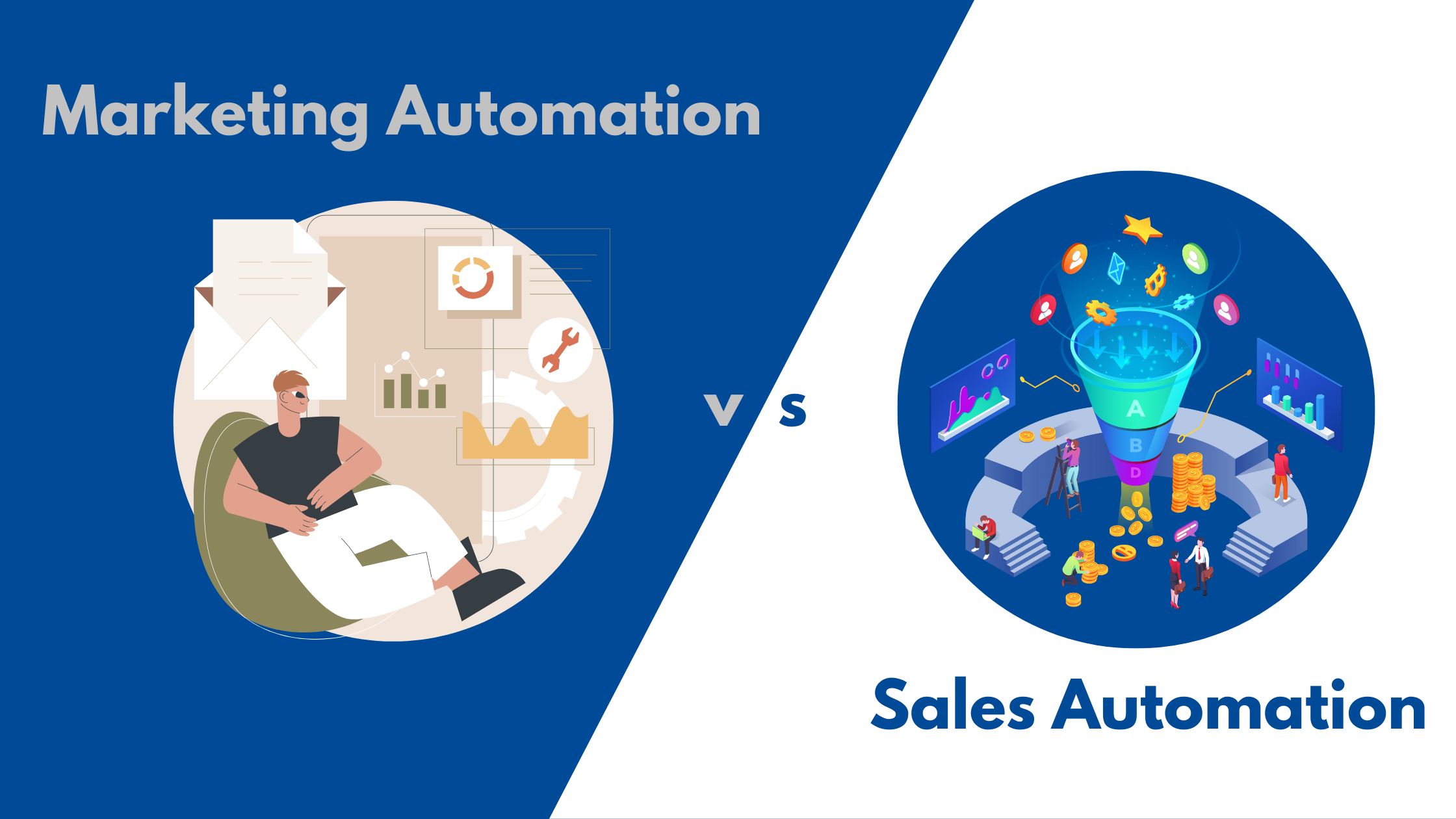To directly step over the major difference between sales automation vs marketing automation will make your base weak, so let us first know what this automation is and which automation can merely benefit the business or if both can merely benefit the business. Supposing you haven’t automated workplace procedures and emails yet. You may be unsure if you want a sales automation or a marketing automation platform due to the similarities they share. Both solutions promise to increase purchases and income while monitoring the inbox activity and launching event-based activities. Despite their many similarities, it is crucial to understand them completely.
Meaning:
Sales Automation:
The goal here is to automate every phase of the sales process so that your salespeople may concentrate more on crucial tasks. Additionally, it enhances team communication, lowers labour costs, improves lead allocation, and results in more accurate sales forecasting.
Marketing Automation:
By easing the development, administration, and evaluation of marketing campaigns, marketing automation software increases the number of leads for a company. It simplifies tiresome campaign procedures like lead scoring and email marketing while keeping track of both online and email interactions.
Marketing automation enables marketers to scale the distribution of hyper-personalized messages to prospects using computerized tracking, scoring, and pre-established rules. Before being handed on to sales, this improves lead qualifying and prospect engagement.
When to Use Automation:
Sales Automation:
Instead of gathering leads, sales automation software helps to close deals. It enables teams to track results and drive deals through the pipeline by taking advantage of the leads that marketing has previously generated. The brand resources sales included at this point are not meant to inform consumers, but rather follow up after phone calls with leads who are farther down the funnel.
If your business is just getting off the ground, you might not need sales automation quite yet. The combination of sales and marketing automation, on the other hand, will let advanced teams optimize their performance by monitoring a larger range of indicators and using AI to predict results.
Sales automation should be used when a potential customer appears to be ready to buy but needs a little encouragement to move through the sales cycle.
Marketing Automation:
The goal of marketing automation is to maximize lead flow to sales while attracting new prospects with compelling content. Marketing does this by producing and disseminating informative content that is specific to each stage of the sales funnel. Through a single system, the software enables marketing to gather, qualify, and exchange leads with sales.
Software for marketing automation can be used at every level of the customer journey. Marketing software may be used by both sales and marketing in smaller or larger organizations. This type of automation is fantastic for low-contact, mass mailings. For example,
Your monthly newsletter, your targeted product advertisement, and your website’s automated nudges will help you optimize tasks and free up time for your advertising team.
Sales Automation VS Marketing Automation
Now that you are aware of what marketing automation and sales automation are, it is necessary to ask what makes them different. While there are similarities between the two automation frameworks, their applications are different. Understanding what makes them unique might be quite important for you.
1. Workflows:
All marketing touchpoints will be monitored and automated by marketing automation. It will ensure that they maintain obtaining more data if a potential customer inputs information on a lead form for a feature.
All internal work procedures can be integrated with sales automation to optimize the sale pipeline. With this, if a potential customer asks for more information about a particular aspect, it will prompt the sales team to connect and qualify their needs.
2. Activity or Tasks:
From the very beginning of a customer’s purchasing journey, marketing automation needs to take part in important tasks. Organizing the clients and maintaining the leads are included in these duties. These can be handled directly from the tool.
Sales automation‘s tasks include following lead scores and closing the transaction, while marketing takes care of developing the leads. The executives are better able to understand where the leads are in their buying cycle thanks to the allocated lead scores.
3. Communication:
In order to carry out one-to-many connects, marketing automation solutions combine a variety of channels, such as team communication tools. Certain communication systems offer on premise and Chat APIs as service offers, allowing businesses to select the one that best corresponds to their needs.
You can control the messaging, delivery, and outcome of that content whether it’s shared by email, social media, or a website.
Unlike sales automation technology, it does not empower one-on-one interactions. Sales automation offers a fantastic opportunity to enable one-on-one discussion of potential solutions, increasing conversion rates.
4. Commitment:
The marketing teams are given more responsibility in order to keep leads within the company. The leads must be maintained by the marketing automation so that they engage. Therefore, ensuring the simplification of the marketing channel during the lead generation cycle is one of the primary responsibilities.
The crucial task of sales automation is calling leads and prospects to schedule meetings. These tests result in a clear conversion stage.
5. Information:
Marketing automation gives you a higher perspective on marketing analytics. Information and execution metrics from advertising activities will be provided via marketing automation.
Sales automation gives you a more in-depth look at prospect associations inside the sales channel. Reports on the lead activity generated by sales automation can let you know where a potential customer is in the sales pipeline. Sales teams can be more strategic with their lead conversion process if they have more information about what steps a prospect has taken or hasn’t taken.
6. Execution:
The biggest challenge one can have is knowing when to implement the automation. Every stage of a customer’s purchasing experience can benefit from marketing automation. Maintaining consumer loyalty might begin with lead generation.
When starting a new business, sales automation can be skipped. It can also be used in conjunction with marketing automation, on the other hand. This kind of automation is not necessary when the quantity of clients and leads is small.
Example:
The automated email series designed for the lead’s stage in the sales cycle is a well-known example of effective marketing automation.
In this approach, a customer comes to your website, finds products they need more, and exchanges their email address for the content. They are thereafter subscribed to a series of messages designed to help them attract paying customers.
These communications should be open about the issues they face and how they are feeling. They gather confidence in your brand and promote your product as a viable solution to their problems. It’s interesting to note that sales automation takes into account all interactions a customer has with your company when a contract is being negotiated. They ask questions in the chat box, watch movies to help them decide whether to buy and receive comments encouraging them to do so.
Making this meeting predictable is the goal here. Therefore, it doesn’t matter which sales representative they speak to. As a result, your documentation is easy to understand and follow.
The lack of sales automation is the primary reason that the vast majority of start-up companies fail. This is because you won’t get the results from any of the other business activities without sales automation. In this circumstance, you might have leads knocking on your door, but instead of closing a sale, you are passing up every chance you are presented with.
Wrapping It Up:
The most important phase of a business is sales and marketing. Every business wants to make as many sales as possible and increase its revenue. Businesses can focus more on their production activities and save time and money by automating sales and marketing tasks. Businesses need to understand the differences between sales automation and marketing automation in order to work better. But one can have both automation if the organization has a better lead approach and gains maximum leads over a period of time. This will help enhance the marketing and sales procedures, and attract new and potential customers, which will eventually help in future growth prospects. Hence, it totally depends on the organization about the choice of automation.






